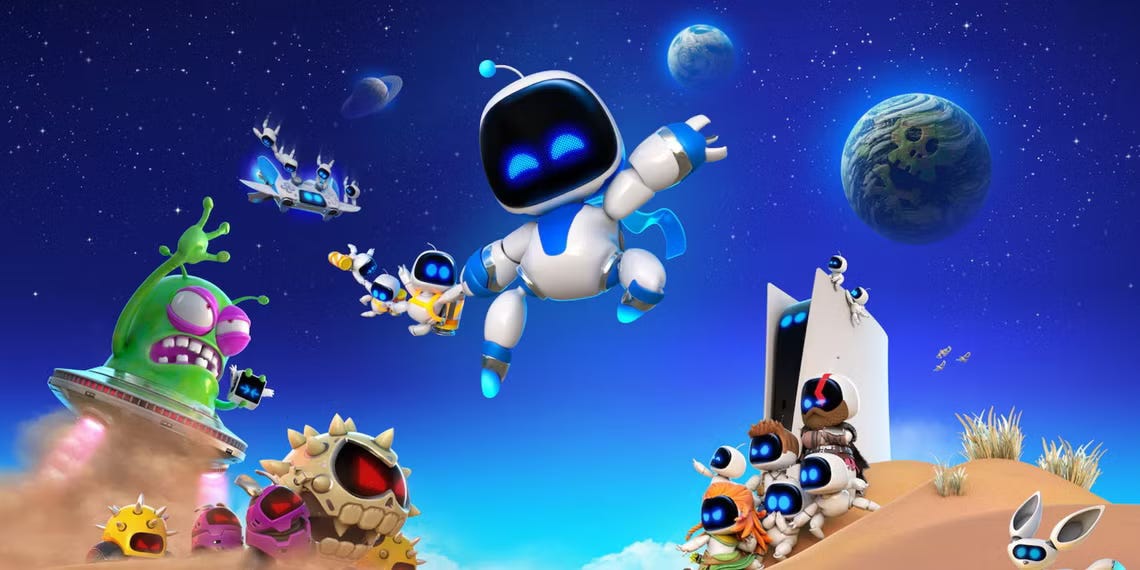Astro Bot Is Pure Videogame Nostalgia
This old-school platformer recalls the days when you fell in love with videogames.
First Released: September 6, 2024
Platforms: PS5
My definition for the word “nostalgia” comes from “Everybody’s Free (to Wear Sunscreen)”, a curio of a song by Baz Lurman that ends with a line stating that nostalgia involves “fishing the past from the disposal, wiping it off, painting over the ugly parts, and selling it for more than it’s worth.”1 How could you say it any better? What a perfect way to capture the innate, unavoidable human tendency to look positively at the past—to remember with perfect clarity all the joys of yesterday while completely forgetting all the pain.
Astro Bot is the history of videogames projected through this sweet, naive, painless lens. It is not just a throwback to an older style of videogames or a game that references older videogames, it’s a work that recreates the experience of falling in love with this medium. It is a game that feels like playing your first game—or, rather, it’s a game that embodies what you remember feeling the first time you played a videogame. The friction or frustration or confusion has been wiped away. All that’s left is the warmth of that incomplete recollection.
There is the obvious stuff in Astro Bot that gestures at the past. The game’s structure is old-school: 3D platformers with short, linear levels haven’t been in vogue since the 90s. Some levels have a pixelated aesthetic, giving off the vibe of an NES game projected in three dimensions. And, of course, there are all the tiny “VIP” bots you must rescue that are dressed up like characters from throughout the 30 year history of PlayStation—a long parade of winking references that often creates pleasant little sparks of recognition.
But the stuff that really induces the bone-deep, almost subliminal feelings of familiarity are all the game’s cheaper tricks.
It’s the moments of graphical flexing, when your character bursts through a tower of beach balls or scatters a pile of tiny gems that remind you of the bygone time when a new videogame, now rendered with an unprecedented number of polygons, would look like magic. Astro Bot probably doesn’t render that many more polygons than its contemporaries, but the game’s tendency to saturate the screen with realistically moving physics objects feels like a similar type of graphical miracle. It manages, in this age of near photorealism, to have moments that are visually stunning from a computational perspective. When was the last time you saw that?
It’s the gimmicks that utilize console-specific features, like sliding your character’s hand along a series of panels and feeling the controller’s vibrations for a unique pattern, like a safecracker sensing a lock’s tumblers fall into place. Moments like these have always been one-offs designed to demonstrate the possibilities a console offered. Never mind that those possibilities almost never evolve into mature, meaningful additions to the medium’s creative vocabulary — that part doesn’t matter. It’s the thrill of possibility, of thinking this is what the future could be that’s exhilarating.
It’s all of the game’s secrets. The levels obscured behind unexpected interactions in menu screens. The hidden areas accessed in unconventional ways. You never know how big a videogame is until you explore it, and when they unspool in unanticipated ways, they can feel infinite, like a universe inside our own. Just how deep does this rabbit hole go?
At least one of these has been something that made each one of us fall in love with videogames. These are the sparkles that caught our eye, the glimmers that intrigued us in the beginning. And here they are again, being experienced in a way that feels like the first time. They are reminders that this is what we love.
But is this all that we love? I notice these details and I see all the tiny characters dotting the game’s hub world, stripped of the context of everything else their games offer, and I see the naggingly persistent stereotype that every videogame offers the exact same kind of mindless fun. Are we really just here for vibration gimmicks and hidden areas and the wonder of seeing a few more polygons rendered at a few more frames per second?
No. No, of course not. Of course there’s more to this medium, more to its past and certainly more to its future.
But all of that is for another day. The day that Astro Bot exists inside of is for reminiscing about the time when this entire medium was new and exciting and magical.
That thing that you fished from the disposal and wiped off and painted over its ugly parts? Even though that thing is the incomplete truth of the past, it’s still the truth. That’s what makes nostalgia so powerful. That little nugget you fixated on was true. It was real. It really was—even if only for a sliver of a moment—that beautiful.
You can’t live inside of nostalgia, but it’s good to visit once in a while.
Those familiar with “Everybody’s Free” will know that this is actually the definition of “dispensing advice,” which the song says is “a form of nostalgia.” I always get the two confused and think that the definition works just as well, if not better, for nostalgia itself. It’s also worth noting that this line should be properly attributed to the author of the newspaper article it’s quoting, Mary Schmich.


